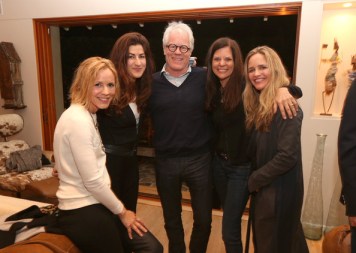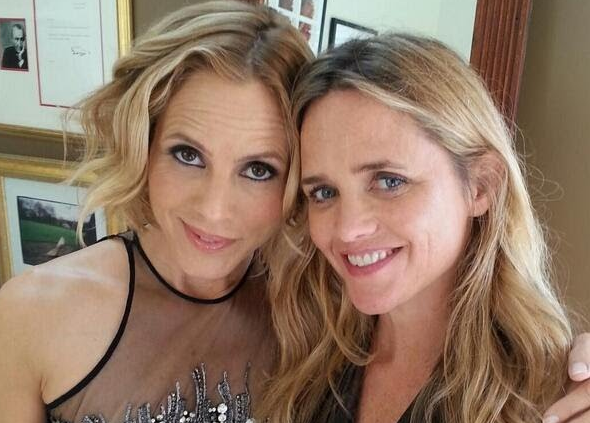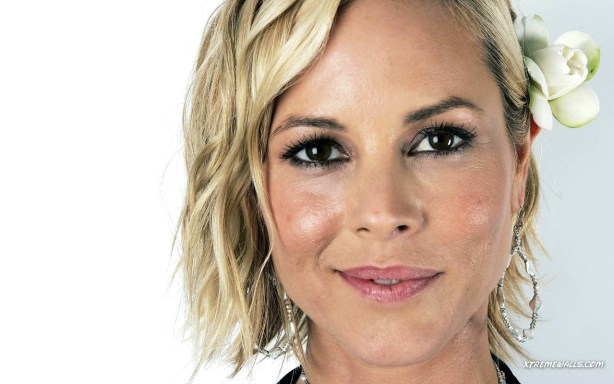Netflix’s Beef Is Very Stressful — It’s Also an Incredible Work of Art
Author’s Note: The following review of Netflix’s Beef contains spoilers.
In A24’s new Netflix series Beef, happiness is a moving target.
Steven Yeun plays Danny Cho, and Ali Wong plays Amy Lau, two strangers who impulsively enter into a bout of road rage starting in the parking lot of a hardware store chain. They’re both unhappy. They’re both angry. Danny is a hustling construction worker living with his younger brother Paul (Young Mazino) and reckoning with the fallout of his parents, now living in Korea, losing their motel. Amy lives with her husband George (Joseph Lee) and their young daughter Junie (Remy Holt) and runs a successful fancy plant store that the CEO of the aforementioned hardware store chain — an evil rich lesbian played fantastically by Maria Bello — is interested in acquiring. If the deal goes through, Amy will be filthy rich. She already is quite wealthy, but there’s always more.
Danny and Amy become locked into their titular beef, a rivalry that escalates into wild proportions. But they also spend the ten episodes in feral pursuit of something forever out of reach. The deal closes, and Amy is still unhappy. Danny buys his parents’ their dream house, and everything goes swiftly to shit. There’s no winning on this show. It is one of the best explorations of obsession I’ve ever seen, especially because it’s such a strange and potent version of obsession between two strangers. Danny and Amy become all id, their anger like a naturally burning source of fuel for the rocket that is this ten-episode series. They think they hate each other because of the ways they’re different, but I think it’s much more complicated than a two-person microcosm of class warfare. I think they see the worst parts of themselves when they look at each other.
The road rage is just the beginning. It unlocks something in Danny and Amy, two people simmering with unreleased anger and constantly chasing after the phantom of happiness. In a crescendoing avalanche of lies, betrayal, emotional and physical affairs, denial, rage, revenge, manipulation, and violence, Danny and Amy enter into a chess game of horrors, often ignoring the problems and broken relationships right in front of them in favor of trying to destroy each other and, in the process, themselves. Everyone becomes dangerously enmeshed. Amy catfishes Paul using photos of her white girl employee, who George has an inappropriate if hard-to-define relationship with. But when Paul learns the truth of her identity, they enter into an affair anyway.
Beef grapples with a lot of the same themes of sex, power, wealth, perception, and deception as the popular series White Lotus but does so with a lot more nuance — especially in its explorations of race — and a lot more creative ambition. Every episode is more unhinged than the last, and yet every beat lands, the stakes ever-increasing but the characters and central themes never becoming muddled or incomprehensible. It’s twisty but it isn’t just a vehicle for shock value. It’s almost impossible to accurately guess what will happen next, and yet it isn’t incomprehensible. It’s strange, unsettling, sexy, all at once. Amy likes to masturbate with an unloaded gun. She accuses George of being vanilla, wants the kind of sex that matches the frenetic, frightening frequency she secretly vibrates with and hides from him and others. Pleasure/shame, repression/release, love/hate, silence/violence, comfort/discomfort — Beef doesn’t just juxtapose these opposing forces; it tackles them simultaneously. Amy and Danny’s senses of their own selves are a constantly shifting thing, both at odds with who they want to be and how they think others think they should be. Identities are fractured and fraught. Their discontent makes for a tightly wound, clenchy series.
If you haven’t watched the show yet, I know it may seem like I’m giving away a lot in terms of plot, but I promise I’m not. And even though there is a distinct and very active plot at play throughout the series, it’s really the finer details that make it such a stunning work of art. Every needledrop, especially the songs that close each episode, charms. The episode titles come from famous quotes, their full context in conversation with the events of the episode. Even the specific execution of the episode title cards, displayed over art I would describe as stressful and signaled by a similarly disturbing abrupt sound cue, adds texture. Beef’s creative ambitions are many, and the finale leans into surreality and experimentation in a way that almost feels like theater.
The entire cast is superb, and Beef gives so much humanity and depth to every single character so that none feel like a device or a caricature in this comedy of horrors. Almost every character is intensely selfish — perhaps with the exception of Paul. But every character is also desperately in search of something just out of reach. Paul wants independence and to feel understood and taken seriously. George lives in the shadow of his late father, a renowned artist of chairs. Even the characters with brief screentime, like Ashley Park’s Naomi, are instantly memorable. Truly Maria Bello is perfect in the role of ultra-wealthy Jordan, whose surprise fiancée after the eight-month jump in episode seven makes for a delightful reveal. And then a moment with her in the penultimate episode is one of the most genuinely shocking things I’ve seen on television in a while, and it’s earned.
But Yeun and Wong are the strongest forces here, transfixing from start to finish. Danny’s breakdown in a church makes for a gorgeously sad scene. Wong fires on all cylinders breathlessly throughout. All of the show’s suspense and intensity is held in this pair’s performances, which are very physical on top of being complexly emotional, with touches of humor, too.
Episode eight is a standout installment, co-written by the author of the excellent queer novel Pizza Girl, Jean Kyoung Frazier. In its first half, Amy’s scenes in the present are interrupted by flashbacks — quite literally, her past self walking into frame with her current self as a way of transition. These flashbacks move in reverse, starting in Amy’s twenties and rewinding all the way to her infancy. They reveal the origins of Amy’s feelings of inadequacy and unlovability, a very young Amy literalizing her feelings that something is wrong and wicked about her with a witch character ingested and reimagined from a book she reads. She sees the witch when she hides a candy bar under her bed, when she catches her father likely cheating on her mother after shoplifting from the mall, when she has anonymous kinky sex with an older stranger she met on Yahoo Chess. The witch is Amy’s shame come to life, and it’s a device that feels as funny as it does frightening, a special chemistry Beef often achieves.
The second half of the episode contains Danny flashbacks, which move chronologically from babyhood to about a decade before the present timeline when he made a truly despicable decision to alter the course of Paul’s life. Danny’s flashbacks recast the dynamic between the brothers, Beef often toying with our assumptions and perceptions.
Beef‘s total decimation of “happiness” doesn’t come off as grating cynicism but rather sharp realism, even as its unspooled in a story that borders on absurdist. Constantly along the way of its spiralling narrative, it asks fascinating questions. Who gets to be angry? What does it mean to be good, to be bad? Can anyone really, truly have it all? Or does that always come at someone else’s cost?
I feel like it’s all I want to talk about, because there’s just so much meat to it, and no I won’t apologize for that pun! I want to say more, but I also think you should go see for yourself. The series itself functions like those works of art featured in its title cards: gorgeous and stressful, chock full of aesthetic detail, symbolism, and meaning. While there’s thematic overlap with other series that contend with class and power, like the aforementioned White Lotus, I also feel confident saying there’s nothing on television quite like it. Beef is doing its own damn thing.
Coyote Mommi Maria Bello Is Engayged to Superstar Chef Girlfriend Dominique Crenn
Actress Maria Bello, best known to Autostraddle readers for playing Coyote Mommi Lil Lovell in the 2000 lesbian cinematic masterpiece Coyote Ugly, showed up at Elton John’s Oscar party last night with longtime girlfriend Dominique Crenn in tow and announced that they were no longer able to fight the moonlight and got engaged in Paris over the holidays. The couple said they’d been out and about and publicly engaged at foodie events around the world, but this was their big Hollywood debut of the announcement. Bello, you’ll remember, came in a New York Times Modern Love column in 2013. Last night, she told E! News that she finally felt grown up enough to be married.
Crenn is an Iron Chef, a star on Netflix’s Chef’s Table, and the only woman chef to earn three Michelin stars, which she did for her San Francisco restaurant, Atelier Crenn. She also one time told a man in an audience at a panel who asked her if she felt like she’d missed out on the “very important role” of being a mother to focus on her career that she was, in fact, a mother of two and that, in her opinion, he should stay home and keep his kids so his wife could go out and be a bad ass woman. And Bello, of course, is known for more than her turn in the queer coming of age tale Coyote Ugly. She was nominated for Golden Globes for The Cooler in 2003 and A History of Violence in 2005 and has starred in dozens of other films and TV series.
Congratulations and best wishes to the happy couple!
Maria Bello is Queer: Actress Reveals She’s Got A Girlfriend In Best “Modern Love” Column Ever

(L-R) Actress/activist Maria Bello, filmmaker Jehane Noujaim, philanthopist Kevin Wall, Dr. Susan Smalley and social impact investor Clare Munn (October 10, 2013 – Source: Christopher Polk/Getty Images North America)
Actress Maria Bello was this week’s New York Times “Modern Love” columnist, and what she had to share about her family came as a relative surprise to most of the universe — the renowned actress and activist is in a long-term relationship with her best friend, social activist Clare Munn.
In the Modern Love piece, entitled “Coming Out as a Modern Family,” Bello recalls a transformative experience looking through her old journals, reading “passages rife with pain and angst” about her past relationships — one of which was with another woman. Bello realized that “it seemed when I was physically attracted to someone, I would put them in the box of being my “soul mate” and then be crushed when things didn’t turn out as I had hoped.” She recalled disastrous relationships with men she’d met on film sets and contrasted these fallouts with the happiness and comfort exuded in a picture she came across of her and Clare from a recent New Year’s Eve. Suddenly, things began falling into place:
We had an immediate connection but didn’t think of it as romantic or sexual. She was one of the most beautiful, charming, brilliant and funny people I had ever met, but it didn’t occur to me, until that soul-searching moment in my garden, that we could perhaps choose to love each other romantically.
What had I been waiting for all of these years? She is the person I like being with the most, the one with whom I am most myself.
The next time I saw her, in New York, I shared my confusing feelings, and we began the long, painful, wonderful process of trying to figure out what our relationship was supposed to be.
Bello details coming out to her son (it went well) and to her “large, Italian-Polish, “traditional” Philadelphia family (they approved) and the difficulty of defining the roles any of the people she considers “family” play in her life — like her son’s father, TV Executive Dan McDermott, who “will always be my partner because we share Jack,” and her ex Bryan, who she says “remains my partner because we share our activism.” She recalls that this past summer, while very ill, “the people who were at my bedside every day at the hospital were many of my life partners: my mother, Jackson, Dan, my brother Chris and Clare.” It’s a really touching and well-written piece that reflects a more fluid and evolving family structure than we usually have a chance to see in the media.

Nothing about this isn’t perfect
46-year-old Maria Bello was born in Pennsylvania to a Polish-American mother and Italian-American father, and was a Political Science major at Villanova planning on becoming a lawyer when she took an acting class and got hooked. Bello started out in off-Broadway plays, and gradually worked her way onto television shows like Misery Loves Company and Due South, eventually snagging a spot on the cast of E.R. as Dr. Anna Del Amico. She has since done commercial movies like Coyote Ugly and The Mummy: Tomb of the Dragon Empire, but has received the most acclaim (and Golden Globe nods) for her work in indie-ish films like The Cooler and A History of Violence. She recently played the lead role in the TV series Prime Suspect and Grace Dover in the film Prisoners.
Bello is also a dedicated activist, founding WE ADVANCE in 2010 in the aftermath of the Haiti Earthquake, a “women’s rights-based, grassroots movement.” WE ADVANCE focuses on “capacity building for women throughout the country” by providing a health clinic, education and empowerment programs, and advocating for women in local, national and international levels.

Today, on her blog, Bello posted a photograph of the published article, with the following message:
After a love packed three days on the east coast with my beloved; modern family, extended family and dearest friends, I am now returning home filled to the brim. As I fly out of JFK I am reading the article I wrote in today’s New York Times section, Modern Love, and I am so happy I wrote this and so grateful to all the people worldwide who have sent in 100s and 100s of beautiful tweets or posts about it. Thank you. May we all learn to live and love our truth. Fully and graciously.